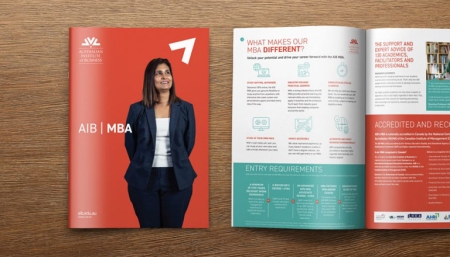How to incorporate my MBA skills into my resume

A strategic and compelling resume is important for making a good first impression. But recounting and distilling your entire career history can be challenging – especially for MBA students who often have a lengthy work history and list of achievements.
Australian Institute of Business (AIB) is a registered higher education provider with a wide range of high-quality tertiary programs for busy working adults. With over 35 years of history, we’re one of Australia’s most established private education institutions, and we pride ourselves on being future-focused and dedicated to continuous improvement.
Whether you’ve just begun, or you’ve already completed your studies, your MBA is a standout feature you must put on your resume. But what’s the industry standard when it comes to adding it to your CV? After all, this is your opportunity to show off – and you want to execute your MBA to its full potential. Read on to learn how to incorporate your MBA skills into your resume.
How long should my resume be?
Keep your resume succinct but meaningful. For management and c-suite roles, your CV should be no more than two pages, three at most – excluding the cover letter. For other particular positions, three to four pages can be ideal.
Reducing your resume to just a few pages is also a good exercise to help you identify your most important skills and achievements. It will also help you identify the key areas where you can add value to a business and be poignant in the interview process.
Read: The Key Skills To Highlight On Your Post-MBA Resume
How to incorporate your MBA skills into your resume
Add it to your header or title
Obtaining an MBA is a great achievement and should be front and centre – particularly if it is useful to the role you are applying for.
Having an MBA shows your dedication and commitment to acquiring one of the most prestigious graduate degrees there is, so it shouldn’t be left out. Just remember not to add MBA to your header until you have completed and passed your studies.
Add it to the education section
When it comes to the education section, make sure that the entries are in reverse chronological order, starting with your most recent educational experience. Include the full wording – Master of Business Administration (MBA), any areas of specialisation and the name of the institution where it was acquired.
Read our article on how hiring MBA graduates can help boost company ROI
List your MBA after your name
Your resume isn’t the place to be modest so add your MBA at the top of your resume, right after your name.
For example, if the job position requires or prefers a candidate with an MBA, make it easy for recruiters to spot your qualifications by listing it next to your name.
How to add an ‘MBA in progress’
Should you add your MBA to your resume if you haven’t graduated yet? Absolutely!
To add an ‘MBA in progress’ to your resume, simply put the start date with a dash followed by ‘anticipated completion date’. This will give the reader full transparency that your studying is still in progress.
Highlight key skills that you acquired from your MBA degree
An MBA helps you acquire highly regarded skills that are extremely valuable to businesses looking to boost ROI. Core skills that an MBA teaches include but are not limited to:
- Critical thinking: The ability to review or observe all facts, evidence and history and make informed decisions based on those observations.
- Problem-solving: Finding solutions to complex problems that drive a business forward.
- Communication: An effective communicator can build trust with employees and customers, improve team engagement and productivity and resolve issues effectively.
- Research and analysis: The ability to gather, analyse and interpret data to make informed decisions.
- Lateral thinking: The ability to think creatively as a way to innovate and generate new products, services or ideas that aid business growth.
Soft skills, like the ones listed above, work well in the summary paragraph and the achievement section of your resume. There, you can include as many of the skills required for the job position as possible and highlight how well you can use them.
Hard skills such as foreign language skills and typing speeds are best kept in the skills section of your resume, as these skills don’t require context to showcase your expertise.
Be sure to include relevant accomplishments when discussing your past work experiences, and explain where you used each skill to achieve your goals. For example:
Communication
“Clearly communicated performance objectives with staff, highlighted potential roadblocks with management and achieved unity among newly formed departments.”
Research and analysis
“Successfully created and ran a customer survey to gain valuable insights into product preferences, identify areas of improvement, and implement changes to increase sales.”
Lateral thinking
“Coordinated a community outreach event, negotiated new vendor contracts and launched new marketing campaigns to boost revenue and sales.”
Courses to help you develop more soft skills for your resume
According to the Society for Human Resource Management (SHRM), 97% of employers claim that soft skills were either as or more important than hard skills. However, 46% of new employees leave the company within 18 months – and of these, 89% are due to a lack of soft skills. Enrol in the following courses to boost your soft skill set:
- CX Training – offers courses in creative thinking, time management, teamwork and more to help you grow your personal attributes for professional success
- Dale Carnegie – has soft-skill courses specifically designed to transform people into highly skilled professionals
- SGS Australia – improve your competence, communication, time and people management with effective soft skills training courses.
Delivered online with continual updates, innovations and new releases, the AIB MBA offers genuine flexibility, industry insights, practical skills and the support you need to achieve your goals in our fast-changing world. It’s created for people just like you. Learn more about it.
Explore more AIB blog articles.





